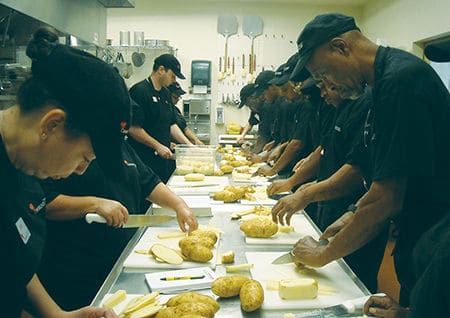Tarrant Area Food Bank
2600 Cullen St.
Fort Worth 76107
817-857-7100
http://tafb.org/
Five hundred thousand people living in the Fort Worth area do not always have enough food to eat. Many of them, off and on, have nothing to eat.
But Tarrant Area Food Bank has a vision of communities where no one has to go hungry.
To help achieve that vision, last year the food bank “rescued” 35 million pounds of food and distributed it to hungry people in Tarrant and 12 nearby counties – Bosque, Cooke, Denton, Erath, Hamilton, Hill, Hood, Johnson, Palo Pinto, Parker, Somervell and Wise counties.
“Feeding the hungry is an ethical imperative,” said Bo Soderbergh, executive director of the food bank. “We believe that access to healthy food is a basic human right, not a privilege. All people deserve regular, nutritious meals.”
And the emphasis today is on “nutritious.”
Two decades ago, the food bank collected and distributed mostly non-perishable food without much attention to nutritional value, Soderbergh said during a recent visit to the food bank.
“We saw hunger more as a lack of calories than a lack of proper nutrition. … We took whatever we were offered and distributed it to whoever needed it. … Today the emphasis is on healthy diets with the focus on produce, especially fresh fruits and vegetables.
“Twenty-five to thirty percent of the food we distribute now is high-quality produce,” he said.
That involves programs such as Mobile Food Pantries, Pantry Express, Senior Share and Meals for Minds. Such programs help assure that produce gets to where it’s needed while it is fresh, said Andrea Helms, director of communications for the food bank.
Refrigerated 18-wheel trucks carry fresh and frozen food to eight locations in Arlington, Fort Worth, Hurst and White Settlement for Mobile Pantries, which look something like well-stocked farmers’ markets.
They are set up once a month on the parking lots of partner agencies and feature seasonal produce. People are encouraged to shop at no cost for the fruits and vegetables they like best, Helms explained.
Pantry Express expands the same outreach concept to markets set up in parking lots in various parts of Tarrant, Bosque, Hamilton, Hill, Hood, Johnson and Wise counties.
Senior Share provides seniors at risk of hunger with nutritious food they can prepare at home along with nutrition and health education. Senior Share operates at Como, Diamond Hill and Fellowship Corner Senior Centers.
Meals for Minds is a pantry distribution program set up at M.H. Moore Elementary School in Fort Worth the third Wednesday of each month during the school year. Every student is eligible to participate in the program, which provides a minimum of 22 pounds of food each month. At least 25 percent of the food is fresh produce.
TAFB’s Community Garden program teaches effective gardening to volunteers who help plant and harvest fruits and vegetables, pull weeds, learn new gardening skills and help distribute garden produce to neighbors in need.
TAFB’s Food for Kids programs, including Backpacks for Kids, Summerpacks for Kids and Kids’ Cafes, provide after-school and summer meals, snacks in school as needed during the day, and non-perishable, ready-to-eat food for children at risk for hunger on weekends year round.
TAFB’s special Community Kitchen program, an intensive 14-week “boot camp,” offers free job training in the culinary arts to individuals seeking work in the food services industry. The program trains 10 to 12 people at a time and graduates find jobs at hospitals, corporate employee cafeterias, restaurants, hotels, food manufacturing companies and other places food is prepared and served.
The Tarrant Area Food Bank was organized in 1982 to collect donated food from food industries – growers, processors, manufacturers, wholesale distributers, grocery stores and food drives – and get it to people who are hungry.
The food bank today empowers communities in this 13-county area to eliminate hunger by distributing high-quality, nutritious food through a network of more than 300 partner agencies that provide emergency groceries, meals and snacks to people in need, Soderbergh said.
Each year, volunteers provide 85,000 hours of service, primarily to inspect, sort, clean and repack the donated food.






